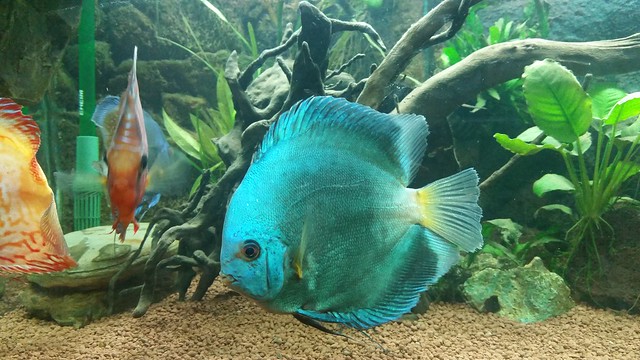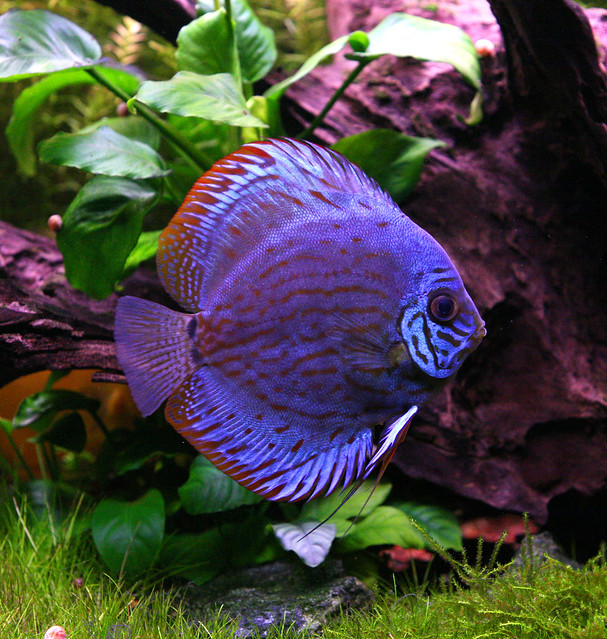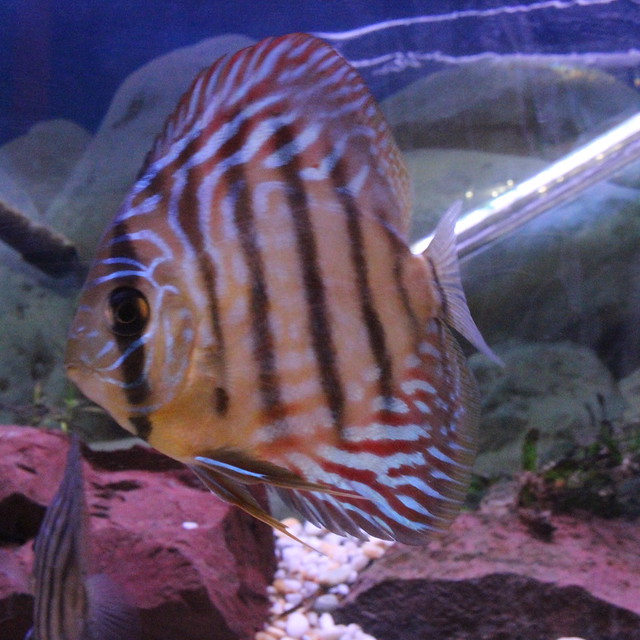 |
| Photo by g_aquarian |
The most fascinating fish you can keep is the Discus. Well, of course, this is just my opinion. These beautiful creatures are very expensive and can cost in the hundreds of dollars for a single fish. I myself find this to be a crazy price tag on Discus and I would never recommend anyone pay over 70 dollars for a single adult. In Michigan, this is where I have my aquarium shop. The going rate on Discus is about 45 dollars for a juvenile and around 70 dollars, on the high end for an adult. With the high price of Discus, I want to give you some secrets which will save you money on your fish because when you do these tips correctly you may never have to purchase another Discus again.
The Next Step
Keeping a Discus aquarium is a blast, however, there is more to the hobby. Even know I love caring for my discus, breeding them is the next level of the hobby. This is fun and is also a great way to save money at the expense of the fish. Breeding discus can be difficult, however, with some proper guidance, it can be a really easy experience. When you care for discus you know how expensive the fish can be. This is why breeding is extremely popular among discus enthusiasts. The Discus is great breeders and in some instances, they will breed in your main tank without even knowing it. This ends up being a nice surprise, so pay close attention if you think this happened. You will see fry swimming around in a few weeks.
Time to Get Started
I want to show you some different ways to start your Discus fish breeding process. I will show the easy and expensive option and also the less expensive method to use. The easy option is to purchase a breeding pair. When purchasing a breeding pair let your dealer know what you are interested in. They will give you some options and pricing information to get you started. Dealers and people who don’t mind spending money prefer this route due to the fact, you can have the fish start mating in a couple of days. The only drawback is this method is very costly. Mating pairs are expensive costing between 200 and 300 dollars for the pair.
You will want to use this next option to save some money on your breeding costs. With this option, you purchase a group of at least 6 discus juveniles. In this method, you are hoping the sexes of the fish will be different. This is not a hundred per cent guaranteed. I can say though this method has never failed me when setting up new tanks and I sue it all the time. I would definitely recommend this option for someone who is just starting to set up their new aquarium.
The Mom The Dad
With some time, in your main tank, you will start to notice who the mating pair is going to be. Discus like to establish a territory within your aquarium. When you see two fish defending it against their other tank mates they are getting ready to breed. Keep an eye on this because these two fish will become mom and dad. Now it’s time to move them both into the breeding tank. A breeding tank is a tank separate from the main tank where you keep your fish. When breeding discus fish it is advised to have at least a 20-gallon tank for the two fish.
We Need To Set Up the Breeding Tank
You want to keep your discus stress free during the tank exchange. Use the water from your main tank to fill the “Discus fish breeding tank”. This will maintain the pH level your fish are used too. Remember to leave the bottom of the breeding tank clear. You do not want to have any rocks or gravel on the bottom of the tank. There is a reason for doing this step. You want to make it as easy as possible to remove leftover food and debris. The only decor which is necessary is a vertical surface for their eggs. “Aquarium Discus Fish” lay their eggs like angelfish do.
Both of these types of fish prefer to lay their eggs using a vertical surface. You will have many options of vertical surfaces. Most people go the easy route and use either a plant such as a Java Fern. What I like to do is use a ceramic pot flipped upside down. When you think your tank looks a little bare I advise to put a potted plant in a corner to give your discus some shelter. All though this is not necessary, remember this tip if your fish feel stressed. Another key in the discus fish breeding process is filtration. I use a sponge filter for the biological load plus I like to use small power filter as well and put a little bag of peat moss in the back to keep the pH level in check.
The Easiest And Most Important Discus Fish Breeding Tip
Keep in mind the Discus fish breeding tank is a usually a lot smaller than your original tank. it is crucial you remember this fact. Check the breeding tank regularly for ammonia spikes and water temperature. Check the water every day and clean the waste out of it every day. This practice is very imperative when breeding discus fish. Discus are very particular about their water conditions when they breed. When your water quality is poor the fish will not even attempt to mate.
Author: Stephen David Jones - Article Source: EzineArticles.com
|






